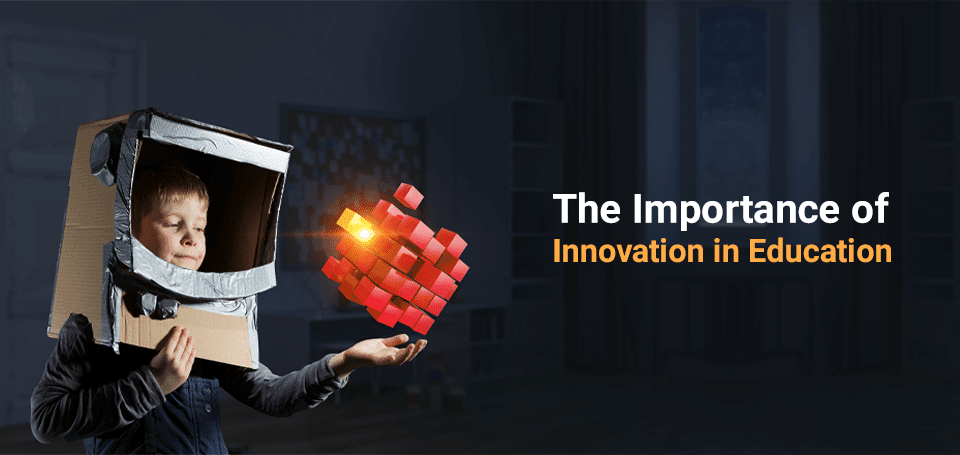Increasingly, innovation in education at school is more than just a buzzword. It is fast becoming a way of learning and teaching for both students and teachers respectively. Innovation in education encourages students and teachers to research, explore, and use all the tools to uncover something new.
Innovation involves a different way of looking at problems and solving them. It also improves education because it compels students to use a higher level of thinking to solve complex problems. Innovation does not just mean the use of technology or new inventions, though these can contribute to innovation. Innovation involves a new way of thinking, thereby helping students develop their creativity and problem-solving skills.
The importance of Innovation in education can be a rather intangible concept and can mean different things to different people. However, there are very real and tangible benefits of innovation in education. Innovation cannot be tested or graded, but it can be inculcated and built up in students. In this environment of high-stakes testing, it can be incredibly difficult to introduce innovation and creativity in the classroom. However, here are eight different ways that the importance of innovative teaching can introduce innovation in the classroom…
Challenge students by giving them a problem that is both authentic and interesting:
There is no one project for every student. This means that a project has to be flexible enough for students to fit it into their own interests. It also means that teachers need to know about their students’ interests. Authenticity involves using real tools to tackle problems, which do not have their answers printed at the back of a book. Ideal problems involve defining some general parameters and tools but leave the specific problem definition up to the student. An example of such a project could be, “Design a musical instrument that you can play without using your mouth or hands”.
Give students the basics but keep it short:
You will need to give students some basic information and knowledge to get started on their projects. However, the amount of information that the class will need will be less than what you would expect. You can chunk this information into organized blocks of 5 to 10 minutes and deliver these in a mini-lesson at the start of the class.
Encourage students to research independently:
If the project design is clear and coherent, students will get the vast majority of the information they need from their own independent research. This research can draw from Wikipedia, internet message boards, programming language documentation, sample code, and so on.
Build complex skills in students:
You can encourage students to use complex tools to complete their projects. Some of these tools include Tickle, Tynker, Scratch, Makey Makey, and so on. Both teachers and students need to become familiar with these tools to use them regularly.
Check that students have understood the concepts:
In a classroom focusing on highly individualized projects, teachers need to monitor what students are struggling with. Optimal learning occurs when students struggle with a problem that they are able to find the solution to. If they cross over into frustration or confusion, they are likely to give up. Teachers should keep careful track of what students know and what they should learn in order to successfully complete their projects.
Ensure that students find innovative uses of everyday objects:
Most people see only a single use for an object. This is called Functional Fixedness. Students can be taught to see beyond this and can also learn how to fashion electric switches out of clothespins or build a robot torso out of a soda bottle. This will help students flex their creative muscles and think beyond the standard uses of everyday objects.
Confirm that students know what they still need to learn:
In order to innovate and solve problems effectively, students need to understand not only what they already know and what they still need to learn. Teachers should build their projects so that students can list the things they understand about their project, as well as the things they need to understand better.
Do not grade students on innovation and creativity:
Grades work really well when there is one correct answer for a specific problem. For projects that emphasize innovation and creativity, there is no one answer. If you want students to own a problem and find a genuinely original solution for it, you cannot motivate them with a grade.
At Vikas, The Concept School, we encourage true innovation in education. In fact, innovation in education is woven into the very fabric of learning at Vikas. Our teachers use technology as well as the latest pedagogical tools to encourage our students to think out-of-the-box and innovate in and out of the classroom.
We use innovation by integrating different subjects and giving hands-on experience in science, technology, engineering, art, and mathematics. At Vikas, we also understand that every student is different and so, we assign projects to individual students based on their interests and capability.
Vikas also encourages students to develop different Life Skills, thereby inculcating innovation and unleashing the creativity of students. So, if you are looking for an approach to education that is creative, innovative, and cutting-edge, look no further than Vikas, The Concept School!
Vikas, a K-12 institution has been a pioneer in delivering holistic education with a blend of academic and cultural activities within a technologically and globally connected environment, over the last 3 decades. Vikas is honored with various International and National awards from the British Council, Brainfeed, and other reputed organizations in the areas of excellence and performance. Vikas has given this nation more than 1 Lakh Engineers and 10000+ Doctors. To foster 21st Century Skills, Vikas established the ATL Labs, Robotics Lab, Artificial Intelligence, and Entrepreneurship Courses.
Thanks
Vikas, The Concept School | +91 7702900900 | www.vikasconcept.com

